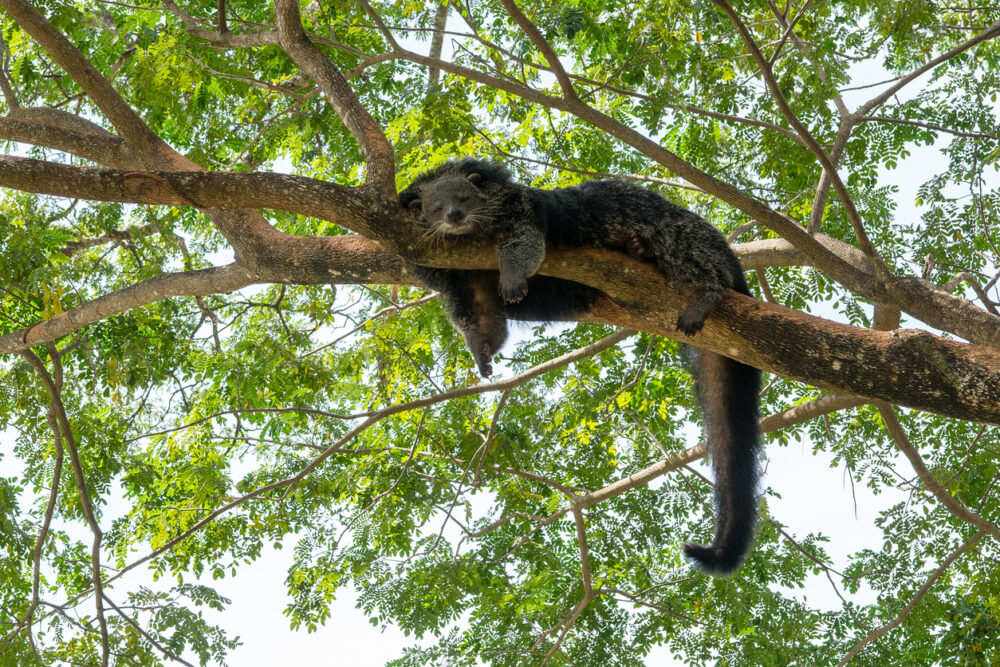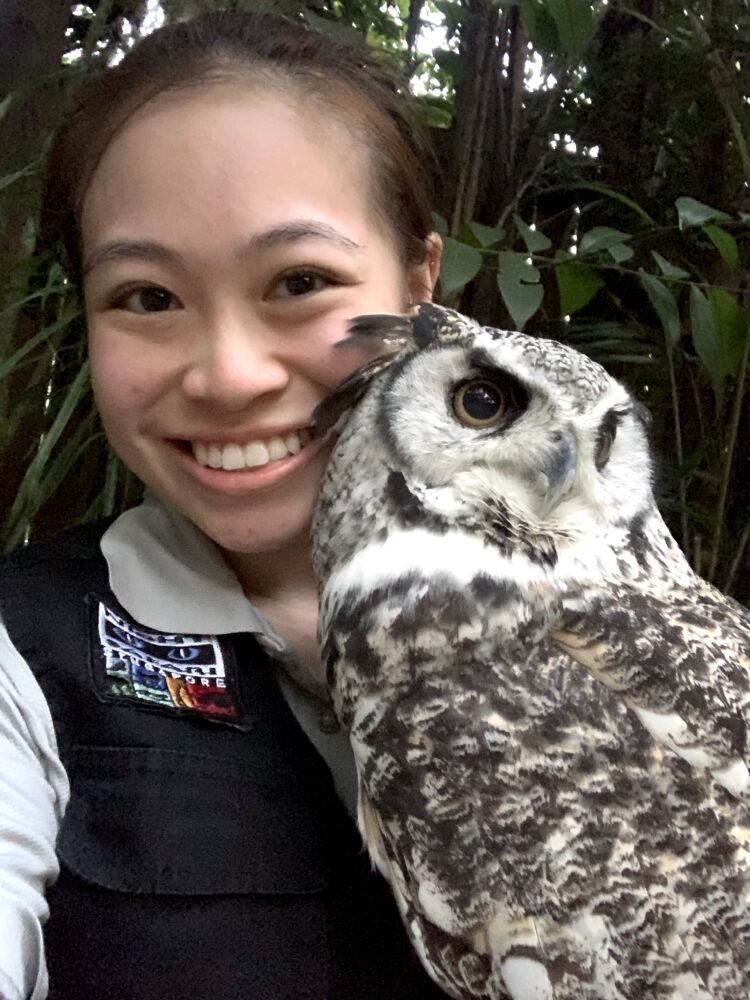Meet Carisa Lam, an animal-trainer-turned-research assistant at NUS Business School. Marrying both passions for animals and research, Carisa is now doing research on how animal interactions can affect human behaviour at the workplace.
Carisa loves animals and has three dogs at home. While studying psychology for her undergraduate studies at the University of California, Santa Cruz, she took on pet-sitting stints and dog training stints all around California.
The Singaporean returned home after graduating, working part-time at the Singapore Zoo as an animal trainer.
“I was lucky enough to train binturongs and a banded mongoose to behave cooperatively for healthcare checks. For instance, they would walk into pet carriers willingly so that they could be taken to the vets, or position their feet in a particular manner for force-free nail trimming and body checks,” said Carisa.

Stock photo of a binturong—an Asian bearcat with a strong tail that can grasp objects. Binturongs also have a distinctive scent that smells like buttered popcorn. Carisa shared that one of the binturongs in the zoo, Jade (not the one in the picture), has a fondness for bananas and sweet talk. (Photo credit: iStock)
She also spoke enthusiastically about pelicans—white water birds which have long beaks and large throat pouches. “They may look the same to visitors, but to the animal trainers, each pelican looks unique and has their own name and personality,” said Carisa.
Besides the Singapore Zoo, she also worked part-time at a dog training school.
Working with the animals was fun, but another of her passions was calling out to her. Carisa had some experience in psychology research during her undergraduate days. When she saw an opening for a research assistant position at NUS Business School, she decided to apply.
Her first research project was with Dean’s Chair and Associate Professor Sam Yam, now Deputy Head of the Department of Management & Organisation and Assistant Dean (Faculty Development). The research team studied how animal interaction at work impacts employees’ emotions and behaviour towards other people. The study is currently at the review stage.
Carisa hopes to improve people’s understanding of working with animals. “Compared to the West, people in Asia may not know much about animal-assisted services, such as working with animals in therapy to help people who have certain physical or mental conditions. But animals have a special role in our society, and interacting with animals brings a myriad of benefits, ranging from social to psychophysiological. They can even help us do important work like aiding the disabled, being an integral part of our police and military force, or even detect certain illnesses within healthcare settings,” said Carisa.

Carisa posing with the owl Rainbow, when she worked part-time at Night Safari previously.
She is supportive of pet-friendly workplaces. “Employees who are uncomfortable with animals can feel assured by policies which determine which type of animals can be brought in, as well as where they can go. The animals are not roaming around freely.”
She added, “Some may think that the pet owners may be distracted by their pets at work, but studies have shown that animal interaction actually enhances employees’ creativity and inspiration.”
Carisa is excited about her work as a research assistant at NUS Business School. “I’ve been lucky enough to work under two very knowledgeable and encouraging professors, Assoc Prof Sam Yam and Asst Prof David Daniels, as well as Visiting Research Fellow Polly Kang. With David & Polly, I get to learn from and contribute to a variety of organisational behaviour research in topics such as diversity, prosocial behavior and decision-making.”
Carisa has plans to pursue a PhD in future.
She said, “My supervisors have been incredibly kind and generous with their guidance, and my fantastic experience with NUS Business School is thanks to them. I’m constantly amazed by the unique way they are able to take an observable phenomenon from day-to-day life, dissect the issue to identify potential research directions from it, and pursue answers to those questions with rigour and passion. They are also able to explain really complex concepts in easy-to-follow terms, which I truly appreciate. That, and their willingness to go the extra mile, are reasons why they are such good mentors.
“That is what drives me to continue on the research path, as I love being in an environment where you’re constantly learning and building upon your own knowledge and skillset. Being in the field of organisational behavior also positions me to pursue topics I personally find interesting, which is a big reason for my inspiration and passion in research. It’s what keeps me going.”






